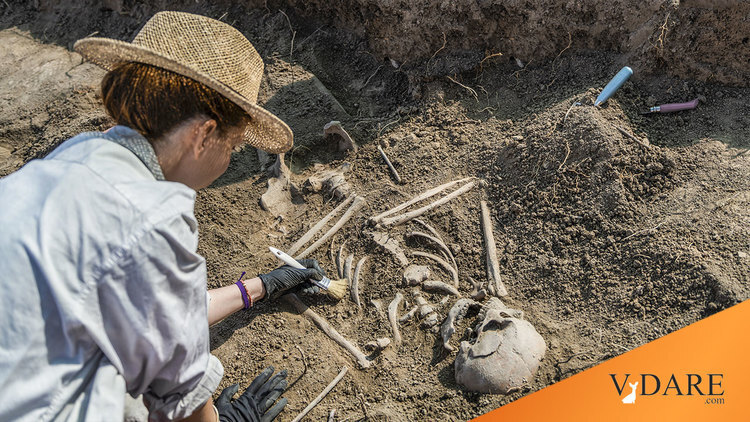
Pitt Anthropologist Laughed At For Saying Scientists Can’t Tell Male And Female Skeletons Apart
By Steve Sailer
04/02/2023
Pro-ignorance science denialism is on the march in academia:
This is how far removed the Left is from reality that they must deny basic scientific facts.🤯@Riley_Gaines_ might not have a PhD in anthropology like Professor Yearwood, but she and her teammates know the physical advantages of biological males over females in sport firsthand.
— Independent Women’s Forum (@IWF) March 30, 2023
Riley Gaines is a swimmer who is making hay on the talk circuit out of the “Lia” Thomas outrage. Oddly enough, she doesn’t appear to be related to the great 1980s swimmer Rowdy Gaines.
Here’s Gabby Yearwood’s description on the Pitt U. website:
Gabby M. H. Yearwood
Teaching ProfessorGabby M.H. Yearwood is a Senior Lecturer in the Department of Anthropology and Managing Faculty Director for the Center for Civil Rights and Racial Justice in the Law School at the University Pittsburgh. He is a socio-cultural anthropologist
I.e., he doesn’t know anything about bones.
earning his Ph.D
So he doesn’t have a Ph.D.
from the University of Texas at Austin in Anthropology focusing in Black Diaspora Studies and Masculinity. His research interests include the social constructions of race and racism, masculinity, gender, sex, Black Feminist and Black Queer theory, anthropology of sport and Black Diaspora. Dr. Yearwood holds a secondary appointment with the Gender, Sexuality and Women’s Studies Program at Pitt. Dr. Yearwood is also a teaching member of the Pitt Prison Education Project.
https://www.civilrights.pitt.edu/
https://www.anthropology.pitt.edu/anthropology-and-anti-racism
Research Description
Dr. Yearwood has conducted research with high profile college athletes gaining insight into the ways in which young men create and sustain masculinity and race in relation to their social lives as athletes at institutions of higher education. He is most interested in examining the structures of race, gender and sexuality as they are informed by institutions of sporting life.
So, he’s a sports fan, but he’s never noticed women have proportionally wider hip bones than men?
Courses
Activist AnthropologyFollowing the work of activist anthropology this course will teach students that “critical engagement brought about by activist research is both necessary and productive. Such research can contribute to transforming the discipline by addressing knowledge production and working to decolonize our research process. Rather than seeking to avoid or resolve the tensions inherent in anthropological research on human rights, activist research draws them to the fore, making them a productive part of the process. Finally, activist research allows us to merge cultural critique with political action to produce knowledge that is empirically grounded, theoretically valuable, and ethically viable.” (Speed 2006). This course will teach students both the importance and value of conducting research that moves outside of the “ivory tower” of academia. “[A]ctivist scholars work in dialogue, collaboration, alliance with people who are struggling to better their lives; activist scholarship embodies a responsibility for results that these “allies” can recognize as their own, value in their own terms, and use as they see fit.” (Hale 2008) This course will explore major conceptual work on the role and ethical responsibility of anthropological research and social justice issues. Students will be required to participate in methodological exercises that will require engagement in the Pittsburgh community.
Anthropology of Race and Science
This course takes a critical look at the narratives and discourses in and around race and its relationship to scientific thought that both essentializes and naturalizes bodies and their capabilities. We will explore narratives which use the tool and authoritative voice of science, scientific method and genetics. In addition, we will look at some of the historical and contemporary narratives of the biological underpinnings of racist discourse and its incorporation into everyday imaginings of social identities. We will look at blogs, internet posts, media, and academic literature to view and critique the ways in which science logic becomes racialized logic.
You see, science is all racist narratives. There are no underlying bones.
Politics of Black Masculinity
This course explores the role and significance of Black Males and black masculinity in American society. Examining the varied social roles Black males have occupied in both literal and symbolic systems students will gain an understanding of the interrelatedness of race, gender and masculinity in American culture and its impact on social, political and legal institutions in America.Anthropology of Sport
Sport captures the minds and money of billions of people everyday, the Olympics, World Cup Soccer, American College Football, and Little League World Series. Yet despite its overwhelming significance in everyday life it goes largely ignored in Anthropological discussions. This course serves to introduce students to the significance and centrality of sport in understanding and interpreting social life. Sport will be critically examined through major anthropological categories of race, class, ethnicity, gender and power.Human Sexuality in Crosscultural Perspective …
Introduction to Cultural Anthropology
A lot of academics operate these days from a tiny number of a priori ideas: e.g., Foucault proved that what we think are facts are just manifestations of power disparities warping narratives.
What more, then, do you need to know?
